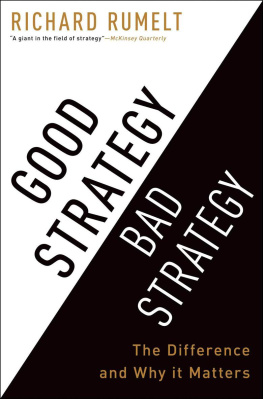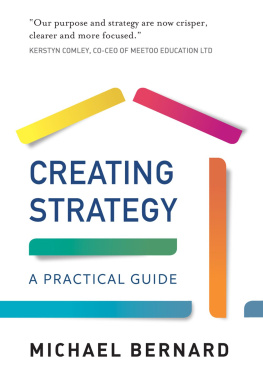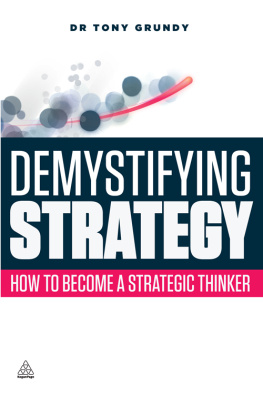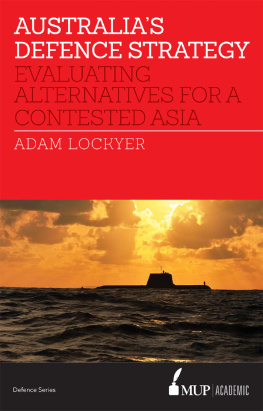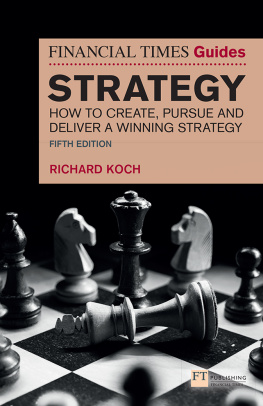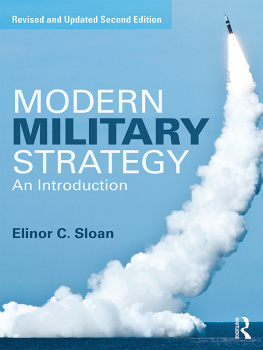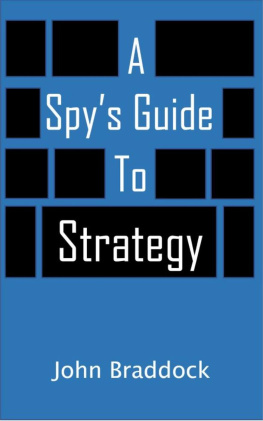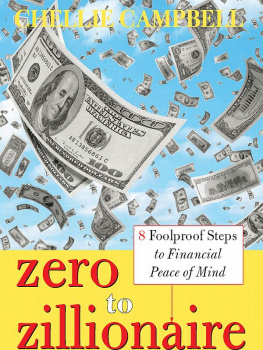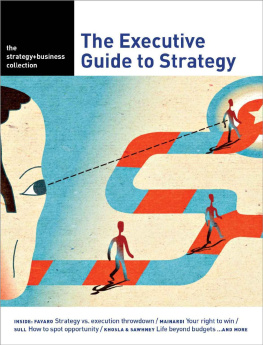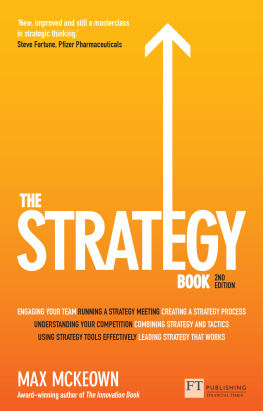Praise for Good Strategy/Bad Strategy
Rumelts new book clearly elevates the discussion of strategy. Using compelling examples and penetrating insights, Good Strategy/Bad Strategy provides new and powerful ways for leaders to tackle the obstacles they face. The concepts of the kernel and the proximate objective are blockbusters. This is the new must-have book for everyone who leads an organization in business, government, or in between.
Robert A. Eckert, chairman and CEO of Mattel
Rumelts nonfast food approach to strategy is terrific. A pleasure to read, this book explains what is, and what is not, good strategy and good strategic thinking. The examples, stories, and anecdotes kept me engaged throughout this well-written book.
Brian Farrell, chairman, president, and CEO of THQ Inc.
In his provocative new book, Richard Rumelt lays bare an uncomfortable truth: Most companies have strategies that are quixotic, muddled, and undifferentiated. This is hardly surprising, since in recent years the very idea of strategy has been dumbed down by a deluge of nave advice and simplistic frameworks. Rumelt cuts through the clutter and reminds managers that the essence of strategy is a clear and differentiated point of view that supports forceful and coherent action. Drawing on a wealth of examples, Rumelt identifies the critical features that distinguish powerful strategies from wimpy onesand offers a cache of advice on how to build a strategy that is actually worthy of the name. If youre certain your company is already poised to outperform its rivals and outrun the future, dont buy this book. If, on the other hand, you have a sliver of doubt, pick it up pronto!
Gary Hamel, coauthor of Competing for the Future
Richard Rumelt really gets it! Too many strategy books delve into esoteric subjects and forget that a strategy is really about action. Rumelt reinforces that a strategy is the set of actions an organization or team should implement and, just as important, the actions an organization should avoid as they drive forward in their market. As General George S. Patton is oft quoted, A good plan violently executed now is better than a perfect plan executed next week. Good Strategy/Bad Strategy focuses the reader on developing a set of actions around identified trigger points and passionately implementing those actions. The book contains many case examples that illustrate Rumelts points. Richard Rumelt reinforces that a strategy is not a goal or objectives. It is the battle plan for action that is designed upon a unique set of attributes or conditions (kernels) that sets an organization apart from its competitors (leverages) and results in exceptional and sustainable profits.
Chuck Harrington, CEO of Parsons Corporation
This is the first book on strategy I have read that I have found difficult to put down. For Rumelt, strategy is no moreor lessthan structured, intelligent thinking about business. This book teaches you how to do it.
John Kay, London Business School
Books on corporate strategy are rare. Rarer still are ones that explain good versus bad strategy through clear illustrations where organizations got it right or wrong. This is a must-read for CEOs or planners whose job depends on getting it right!
Kent Kresa, former chairman of General Motors and former CEO of Northrop Grumman
Any executive reading this book will be motivated to examine the strategy of his or her firm, come to a judgment about it, and then work to develop or improve it. The many fascinating examples of good strategy provide great insight, but even more valuable are those of the bad variety. Rumelt writes with great verve and pulls no punches as he pinpoints such strategy sins as fluff, blue-sky objectives, and not facing the problem.
James Roche, former secretary of the air force and president of Electronic Sensors & Systems, Northrop Grumman
There are precious few books that enable you to not only rethink the way you think but also improve your performance. Richard Rumelts brilliant Good Strategy/Bad Strategy is one, a milestone in both the theory and practice of strategy. Cutting to the core of what makes the difference between success and being an also-ran, Rumelt uses vivid examples from the contemporary business world and global history that clearly show how to recognize the good, reject the bad, and make good strategy a living force in your organization.
John Stopford, chairman of TLP International and Professor Emeritus, London Business School
Good Strategy/Bad Strategy pinpoints the polar difference: the diagnosis and actions that constitute good strategy, the fluff and failures that cause the bad. Richly illustrated and persuasively argued by a researcher, teacher, and consultant, Richard Rumelt has authored the playbook for anybody in a leadership position who must think and act strategically.
Michael Useem, professor of management, The Wharton School, University of Pennsylvania, and author of The Leadership Moment
GOOD STRATEGY/BAD STRATEGY
THE DIFFERENCE AND WHY IT MATTERS
RICHARD P. RUMELT

First published in Great Britain in 2011 by
PROFILE BOOKS LTD
3A Exmouth House
Pine Street
London EC1R 0JH
www.profilebooks.com
First published in the United States of America in 2011 by
Crown Business, an imprint of the Crown Publishing Group,
a division of Random House, Inc., New York
Copyright Richard Rumelt, 2011
1 3 5 7 9 10 8 6 4 2
Printed and bound in Great Britain by
Clays, Bungay, Suffolk
The moral right of the author has been asserted.
All rights reserved. Without limiting the rights under copyright reserved above, no part of this publication may be reproduced, stored or introduced into a retrieval system, or transmitted, in any form or by any means (electronic, mechanical, photocopying, recording or otherwise), without the prior written permission of both the copyright owner and the publisher of this book.
A CIP catalogue record for this book is available from the British Library.
ISBN 978 1 84668 480 7
eISBN 978 1 84765 746 6
The paper this book is printed on is certified by the 1996 Forest Stewardship Council A.C. (FSC). It is ancient-forest friendly. The printer holds FSC chain of custody SGS-COC-2061

For Ruthjane
CONTENTS

Business 101 is surprising
Why Plan A remains a surprise
David and Goliath is a basic strategy story
Marshall and Roches strategy for competing with the Soviet Union
Is U.S. national security strategy just slogans?
Chad Logans 20/20 plan mistakes goals for strategy
The mixture of argument and action lying behind any good strategy
The president of the European Business Group hesitates to act
Centralization, decentralization, and Roosevelts strategy in WWII
How Pierre Wack anticipated the oil crisis and oil prices
Why Kennedys goal of landing on the moon was a proximate and strategic objective
A regional business school generates proximate objectives
Next page
